Comedy of Errors
Words affect our everyday lives. How we spell and pronounce words helps us communicate. Spelling is part of any writer’s lexicon, but who is correct about English, and what is English—British or American? Author RC Blyth examines some origins and dispels the myths about who came first.
Ode to the dictionary
Having reached Central Park in Manhattan in September, I saw the statue of Daniel Webster. I believed I had found a famous lexicographer who had defined English, and I had Ken, a talented photographer, who took pictures. Twenty minutes later, we departed with images of me propping up the statue embedded on Ken’s memory card. Arriving back in the UK two weeks later and intending to complete a blog, I looked up more information on the man associated with the Merriam-Webster dictionary and, with some shock, realised I had the wrong Webster! It was not Daniel but Noah Webster.
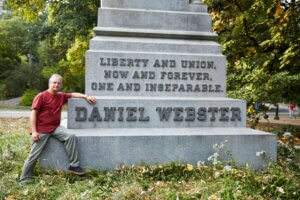
It becomes apparent that Daniel Webster [see FOOTNOTE] is not of the dictionary fame but a famous lawyer. Photo. Ken Levy. Central Park, NY.
The Written Word & Spelling
Noah Webster influenced how English looked to people worldwide and was primarily responsible for the spelling reforms in American English. His spelling of colour seemed more logical than colour, as the British used. This is one of many common variations. In his dictionary of 1806, Webster’s byword was simplicity: why spell it colour when color gives you all the letters you need? If you listen to people speaking English in the USA, those unused to public speaking use more words in their sentences than the British when describing occasions or factual material. This contrasts with Webster’s economy and directness behind spelling in many ways.
If we return to the United Kingdom and refer to the Oxford English Dictionary (OED), this source has been the last word in the English language for over a century. However, it was not until 1857 that the Philological Society, a London-based organization, proposed addressing the deficiencies of existing English language dictionaries. Note the Z rather than the S in organization. The British Dictionary was intended to be based on the evidence of words dating from all periods of the language’s history. Herbert Coleridge was named as the original editor.
So where did Merriam-Webster come in, and why is it the go-to on the web?
George Merriam was an American publisher. Together with his brother Charles, he founded a publishing and printing firm. Their earliest publications were legal, school, and Bibles. After the death of Noah Webster, Merriams purchased the right to publish Webster’s Dictionary in the future.
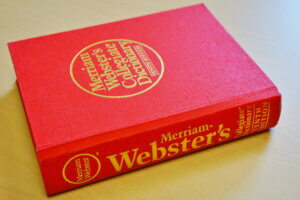
Merriam-Webster English dictionary
For those who criticise American spelling, two indisputable facts emerge. The collection of spelling of words places US spelling earlier than British. The use of the English language is older than American English but was neither formalised nor divided into pure English expressions until formal dictionaries were established for the communities to find common ground.
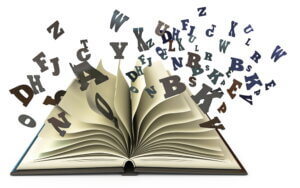
Words even sound different between British and American speakers.
Infiltration and Integration
One of the earliest well-documented sources of English writing came from Samual Pepys (1633-1703), whose style was later included in the OED or Oxford English Dictionary. Some of this style would have transferred across the Atlantic to early settlements, where the English set up homes provoked by religious persecution in England.
British school students know William the Conqueror invaded England in 1066. However, many might not know that Norman French dominated the language at the King’s and nobles’ court. The story does not start at the beginning of the second millennium because the Romans invaded Britain and settled from 43 AD until 410 AD. Roman language or Latin infiltrated into the language as it had in France (Gaul), so even French was infiltrated with keywords.
Additional invasions of Britannia by the Danish, Dutch, German Saxons, and sea-faring Viking peoples from Scandanavia altered the language before the Normans arrived. English, therefore, is a West Germanic language that originated from Ingvaeonic languages brought to Britain in the mid-5th to 7th centuries AD by Anglo-Saxon migrants. Various names have been used to describe modern Britain, mostly referred to as the United Kingdom or the UK today. While Greece never invaded Britain, an explorer named Pytheus visited before the Romans. When the Romans arrived, many Greeks came with them, and Britain attracted the Greeks over many centuries. The Greek language has infiltrated Latin and Norman French, thus complicating spelling. Pytheas travelled to Britain around 325 BC and recorded the local names of the places he visited. Unfortunately, Pytheas’s writings do not survive, but the Greek author Diodorus Siculus recorded one of the island’s names as ‘Pretannike’. Classical Greek and Latin texts use ‘p’, which is then turned into a ‘b’, becoming ‘Britannia’. Source: These Islands 2017. Accessed November 2024.
The most important lesson is that the English are not the original island peoples of the UK, but Britons made from various tribes. It is no wonder that by the time of Webster and Coleridge, some uniform approach was desired if standard education was to be forged to help communication. It has been suggested through trade that the English were better at languages than today, where modern English—both American and British—has dominated film, social media, and various dominions around the globe, making us lazy. Americans tend to teach Spanish as their second language and the British, French with a smattering of Latin. The latter is a classic language and less popular than other languages offered in schools.
Altering Syntax & Whole Words
“There are differences in American English where Americans remove verbs from a sentence. When an American person tells someone they’ll write a letter to them, they say “I’ll write them”. When you ask an American if they want to go shopping, they might say “I could”. In the UK, these replies would sound strange, as we would say, “I’ll write to you” and “I could go”. Dropping the verb suggests Americans want to speed up speech delivery– or maybe because the British just like to spell out exactly what they’re saying. Nobody’s right here, but if we declare a winner, it would be British English because the American way doesn’t make sense.” Reference accessed November 2024
The British and Americans have evolved in different directions for different reasons. Many objects are named differently, so a certain amount of translation is needed: aubergine (UK from Arabic), eggplant (US—the appearance of a purple egg), trunk (US), boot (UK) for the motor car, or is it motor vehicle. Pants (US—pantaloon), trousers (UK), coriander (British from French), and cilantro (American from Spanish).
There are plenty of examples, from diapers to aluminum—
The word “diaper” came to refer to the cloth undergarment itself. The term “nappy” has a similar evolution, although from a different root word. It derives from the Middle English “nappe”, meaning a cloth from the Old French “nape”—reference to quote Accessed November 2024.
The basis for aluminum comes from the chemical alumina. The word was first proposed by Davy (UK) in the form alumium, and changed by him to aluminum; but was finally made aluminium to conform to the periodic table— sodium, potassium, etc. Noah Webster, in his 1828 dictionary defined aluminum based on alumina. Quoted from source Mirriam-Webster.
Authors and readers of books are stuck in a polyglot language of many origins. English is not specific to one country or owned by any particular community. However, we are not quite at the Tower of Babel proportions yet. I have written in both styles mainly for the audience on one side of the Atlantic or another, depending upon which dominates my work. Spending years visiting the USA and making friends has shaped my vocabulary and understanding. One American friend chants to his wife when he fails to understand me-
“What’s he saying – I can’t understand a word,” and then bellows – “accent crisis!”
FOOTNOTE
Daniel Webster (January 18, 1782 – October 24, 1852) was an American lawyer and statesman representing New Hampshire and Massachusetts in the U.S. Congress . Webster was one of the most prominent American lawyers of the 19th century.
“Words and Spelling Across the Atlantic” written for ConsultingFootPain under Busypencilcase Communications.
R.C.Blyth is a pseudonym used for novels and fictional writing. See more about the author here.
Published 8 November 2024
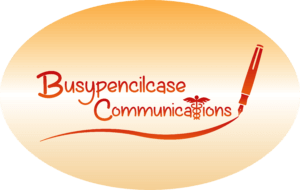
Established 2015. The UK. England.
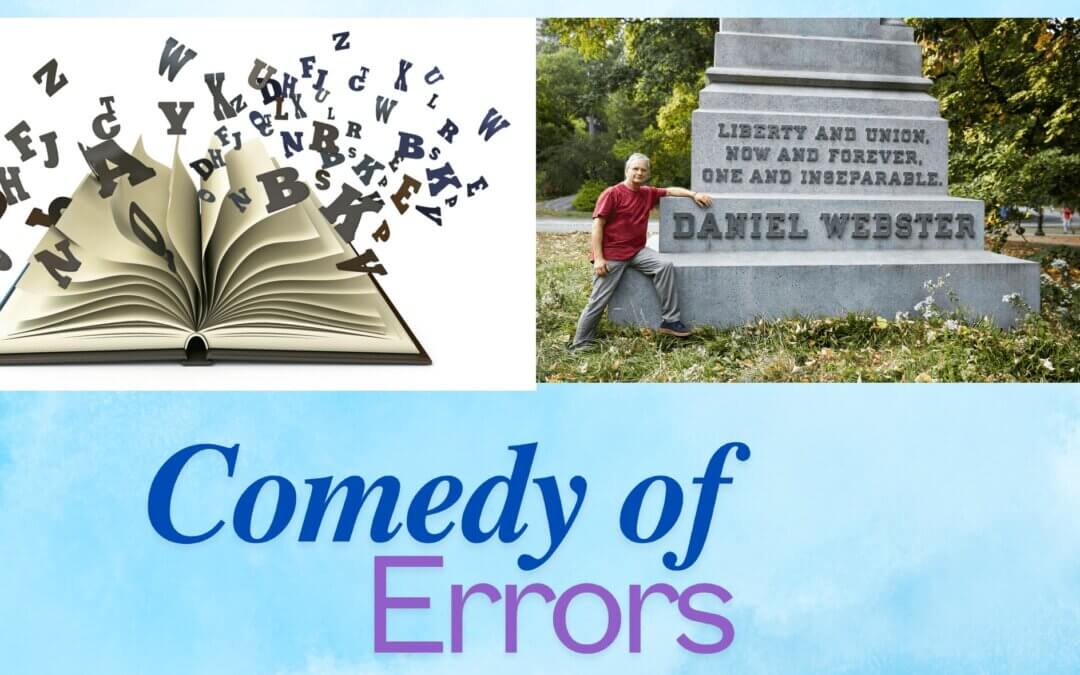
That was very good! And no accent crises